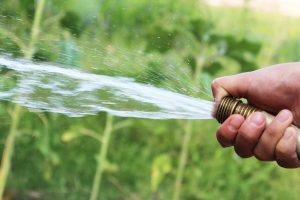 Landscaping around your home is a great way to improve its value, create natural beauty, give yourself a perennial hobby, and grow healthy food for your family (if that landscaping includes a vegetable garden). It’s all for naught, however, if you don’t make eco-friendly choices when building the space and maintaining your plants. Here are some ways to ensure that your landscaping is as environmentally sound as it is beautiful.
Landscaping around your home is a great way to improve its value, create natural beauty, give yourself a perennial hobby, and grow healthy food for your family (if that landscaping includes a vegetable garden). It’s all for naught, however, if you don’t make eco-friendly choices when building the space and maintaining your plants. Here are some ways to ensure that your landscaping is as environmentally sound as it is beautiful.
Avoid the use of synthetic fertilizers and pesticides
While it’s true that chemical fertilizers do help plants grow, and pesticides and herbicides do keep pesky bugs and weeds at bay, they are quite detrimental to the environment, and your eco-friendly landscaping project should steer clear of them. As Better Homes & Gardens points out, you may not even need to alter the chemical composition of your soil with fertilizers to produce a lush landscape. Test your soil for its nutrient content and pH level. There are natural ways to alter this, if need be.
If you want to feed your family healthy, organic food, then using pesticides in your vegetable garden is certainly a no-go. But even if you’re simply worried about pests in your flower garden, there are plenty of reasons to forgo pesticides. Maybe the biggest reason is that they harm pollinators like bees, birds, and other good insects that help your landscaping flourish. Once again, there are a variety of effective, natural ways to keep pests at bay.
Focus on conserving water
Nothing is more harmful to an eco-community than wasting water, our most precious natural resource. Any steps you can take to conserve water in the maintenance of your landscaping will help the environment. One way is to install a drip-irrigation system when building your beds. A drip-irrigation system is a low-pressure, energy-efficient system that applies water slowly to the base of plants. It’s easy to go the DIY route with this. Other ways to save water in the long run include mulching, which slows water evaporation; collecting water in rain barrels and using that to water your plants; and keeping your lawn mowed at a higher level, as it won’t require as much water to maintain itself.
Try to limit your waste
Reduce, reuse, and recycle. You’ve heard it before. When it comes to landscaping, it should be your mantra. Try to reduce the use of bags when picking up grass clipping and weeds. Either put them in yard-waste receptacles or simply let them fall where you cut them—they will eventually become natural fertilizer. Reuse plastic containers around your house in smart ways. You can grow plants from seed inside yogurt containers and transplant them later, or cut the bottoms off two-liter soda bottles and place them around seedlings and sprouts to facilitate growth. Recycle your food trimmings and leftovers by composting. If you compost, you’ll never need to buy any sort of soil enhancers ever again; you’re making the most natural, healthy fertilizer there is. Lastly, learn how to properly store fruits and vegetables to reduce (or, ideally, eliminate) food waste.
If you want to give back to Mother Earth for the beauty you enjoy every day, there’s no better way than making sure that you garden in an environmentally sound manner. In many cases, eco-friendly gardening is much more cost-efficient, too. You’ll be off to a great start if you focus on the three R’s of recycling, try to conserve water at every turn, and use natural ways to fertilize your plants and prevent pests from invading your landscaping.
Photo Credit: Pixabay

